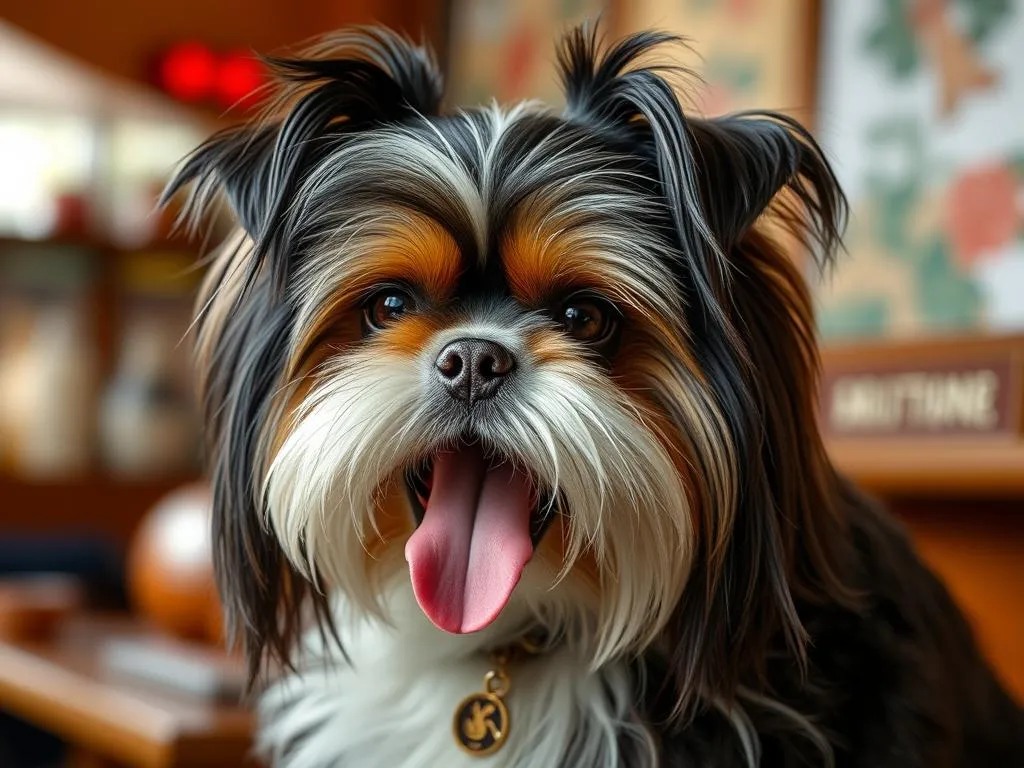
Introduction
When it comes to choosing a pet, dog breeds shine brightly in popularity across the globe. Their diverse characteristics, sizes, and temperaments make them suitable companions for various lifestyles and families. Among these breeds, mixed breeds have gained significant traction in recent years, offering unique combinations of traits that appeal to prospective pet owners. One such breed of interest is the Japanese Chin.
The Japanese Chin is a toy breed known for its charming personality and elegant appearance. Originating from Japan, this breed has a rich history intertwined with nobility and companionship. With their affectionate nature and adaptability, they make wonderful pets. As we delve deeper into the world of Japanese Chin mixes, we’ll explore their characteristics, benefits, and the care they require, ensuring you have all the information you need to consider adding one of these delightful mixes to your family.
Understanding Japanese Chin
History of the Japanese Chin
The Japanese Chin has a fascinating history that dates back centuries. Originating in Japan, this breed was favored by the Japanese aristocracy, often accompanying royalty and noble families. The Chin was revered not only for its beauty but also for its charm and affectionate demeanor. Its royal connections have made it a symbol of elegance and companionship.
Over the years, the breed has evolved, with its appearance and temperament being shaped by selective breeding. Despite its evolution, the Japanese Chin has managed to retain its endearing qualities, making it a beloved companion for many dog lovers worldwide.
Physical Characteristics
The Japanese Chin is a small dog, typically weighing between 4 to 9 pounds. They stand about 8 to 11 inches tall, making them perfect for apartment living. Their coat is long, silky, and often features a distinct feathering on the ears, tail, and legs. One of the most recognizable traits of the Japanese Chin is its flat face, which gives it a regal appearance.
Color variations include white with black, red, or sable markings. Their unique facial structure and tail, which curls over their back, further enhance their charm. The Japanese Chin is not only known for its looks but also for its graceful movement, often compared to that of a cat.
Temperament and Behavior
The temperament of the Japanese Chin is one of its most appealing traits. They are known for being affectionate, playful, and intelligent. This breed forms strong bonds with their families and is often eager to please. Their friendly nature makes them suitable for families with children and other pets.
However, potential owners should be aware that Japanese Chins require socialization to prevent any shyness or aloofness towards strangers. While they generally get along well with others, early exposure to different people and environments can enhance their confidence and sociability.
What are Japanese Chin Mixes?
Definition of Mixed Breeds
Mixed breeds, or mutts, are dogs that have ancestry from two or more different breeds. This genetic diversity often leads to unique characteristics, making each mixed breed special in its own right. Japanese Chin mixes, in particular, combine the delightful traits of the Japanese Chin with those of another breed, resulting in an endearing companion.
Adopting a mixed breed can come with numerous benefits, including hybrid vigor, which often leads to better health and fewer genetic disorders than purebreds. Additionally, mixed breeds can display a wide range of temperaments and appearance, allowing prospective owners to find a dog that fits their lifestyle perfectly.
Popular Japanese Chin Mixes
Several Japanese Chin mixes have become popular among dog enthusiasts. Here are some notable examples:
-
Japanese Chin + Poodle: This mix combines the elegance of the Japanese Chin with the intelligence and hypoallergenic qualities of the Poodle. These dogs are often playful, smart, and highly trainable, making them excellent companions for families and individuals alike.
-
Japanese Chin + Shih Tzu: The union of these two toy breeds results in a small, affectionate dog with a lively personality. These mixes often boast a beautiful coat and can be quite sociable, making them great for families.
-
Japanese Chin + Chihuahua: This mix tends to be energetic and spirited, inheriting the boldness of the Chihuahua along with the affectionate nature of the Japanese Chin. They are often loyal companions who thrive on human interaction.
Each of these mixes inherits traits from both parent breeds, resulting in unique personalities and physical characteristics. Visual examples of these mixes often showcase a delightful blend of features that make them stand out.
Advantages of Japanese Chin Mixes
Health Benefits
One of the most significant advantages of Japanese Chin mixes is the potential for hybrid vigor. This phenomenon can lead to healthier dogs with fewer inherited health issues. Purebred Japanese Chins may be prone to certain health problems, including dental issues and respiratory difficulties due to their facial structure. However, when mixed with other breeds, these health concerns can be less pronounced.
For instance, a Japanese Chin + Poodle mix might inherit the Poodle’s robust health, reducing the likelihood of common health issues faced by purebreds. Adopting a mixed breed can contribute to a longer, healthier life for your furry friend.
Temperament and Adaptability
Japanese Chin mixes often exhibit a blend of temperament traits from both parent breeds, making them adaptable to various environments and lifestyles. They can be playful and energetic like the Chihuahua or calm and affectionate like the Shih Tzu. This versatility means that these mixes can thrive in different settings, whether in an active household or a quieter home.
The behavioral traits inherited from both parent breeds can make Japanese Chin mixes suitable for families with children, singles, or seniors. Their ability to adapt to different lifestyles ensures that they can provide companionship and joy to a wide range of owners.
Care and Maintenance of Japanese Chin Mixes
Grooming Needs
Grooming is an essential aspect of caring for Japanese Chin mixes. Depending on the coat type inherited from their parent breeds, grooming needs can vary. Generally, owners should expect to brush their dog’s coat several times a week to prevent matting and tangles, especially if the mix has a long, silky coat.
Recommended grooming tools include:
- A slicker brush for detangling
- A comb for finishing touches
- A dog-safe shampoo for regular baths
The frequency of grooming may increase during shedding seasons or if your mix has a particularly thick or long coat.
Exercise Requirements
Despite their small size, Japanese Chin mixes require regular exercise to maintain their health and happiness. Daily walks, playtime, and mental stimulation are crucial for keeping them engaged. These dogs typically enjoy short bursts of activity, making them well-suited for those who live in apartments or have limited outdoor space.
Both indoor and outdoor activities can be beneficial. Engaging them in interactive play or puzzle toys can provide the necessary mental stimulation while also allowing for physical activity.
Nutrition and Diet
A balanced diet is vital for maintaining the health of your Japanese Chin mix. Owners should provide high-quality dog food formulated for small breeds, ensuring it meets their nutritional needs. It’s important to consider any dietary restrictions or allergies that may arise from the mix’s lineage.
Proper portion control is essential to prevent obesity, a common issue in small breeds. Establishing a regular feeding schedule can help maintain a healthy weight and promote overall well-being. Always consult with a veterinarian for specific dietary recommendations.
Training and Socialization
Basic Training Techniques
Training is crucial for Japanese Chin mixes, as early training helps instill good behavior and reinforces positive traits. Employing positive reinforcement techniques, such as treats and praise, can be highly effective. Clicker training is another excellent method that can enhance learning and communication between the dog and owner.
Common challenges may include stubbornness or distraction, particularly if the mix inherits traits from more independent breeds. Patience and consistency are key to overcoming these obstacles.
Socialization Practices
Socialization is essential for mixed breeds to develop into well-rounded dogs. Exposing your Japanese Chin mix to different people, animals, and environments from a young age can help prevent shyness and behavioral issues later on.
Effective socialization strategies include:
- Attending puppy classes
- Arranging playdates with other dogs
- Introducing them to various environments, such as parks or pet-friendly stores
Signs of a well-socialized dog include a calm demeanor around strangers, confidence in new situations, and a desire to interact with other pets and people.
Potential Challenges with Japanese Chin Mixes
Health Concerns
While Japanese Chin mixes may inherit the hybrid vigor associated with mixed breeds, it’s important to remain vigilant about potential health issues. Common concerns can include dental problems, respiratory issues, and genetic conditions based on the mix’s lineage. Regular veterinary check-ups are crucial to catch any health concerns early on.
Behavioral Issues
Like all dogs, Japanese Chin mixes can exhibit behavioral challenges. Possible issues include separation anxiety or excessive barking, particularly if they come from a lineage that is more vocal or prone to anxiety.
To manage these challenges, owners can establish routines, provide plenty of mental and physical stimulation, and consider training resources for additional support. Engaging with a professional trainer or behaviorist can also help address specific issues effectively.
Conclusion
Owning a Japanese Chin mix can be a rewarding experience filled with joy and companionship. Their unique blend of characteristics from both parent breeds makes them adaptable and endearing pets. By understanding their needs for care, training, and socialization, you can provide a loving and nurturing environment.
If you’re considering adding a dog to your family, a Japanese Chin mix might just be the perfect fit. Their affectionate nature, combined with the potential health benefits of mixed breeds, ensures that they can bring happiness and companionship into your life.
FAQs
Common Questions About Japanese Chin Mixes
What is the average lifespan of a Japanese Chin mix?
The average lifespan of a Japanese Chin mix typically ranges from 12 to 15 years, depending on their overall health and genetics.
How much does a Japanese Chin mix typically cost?
The cost of a Japanese Chin mix can vary widely based on factors like breeder reputation and location, but you can expect to pay anywhere from $300 to $1,000.
Are Japanese Chin mixes good with kids and other pets?
Yes, Japanese Chin mixes generally do well with children and other pets, especially when properly socialized from a young age.
Expert Tips for Prospective Owners
Key considerations before adopting a Japanese Chin mix:
Assess your lifestyle, living situation, and ability to provide time for training and socialization.
How to prepare your home for a new dog:
Ensure your space is dog-proofed, with safety measures in place for hazardous items or areas.
Resources for ongoing support and education:
Consider joining local dog clubs or online communities for advice, training tips, and support from fellow dog owners.









